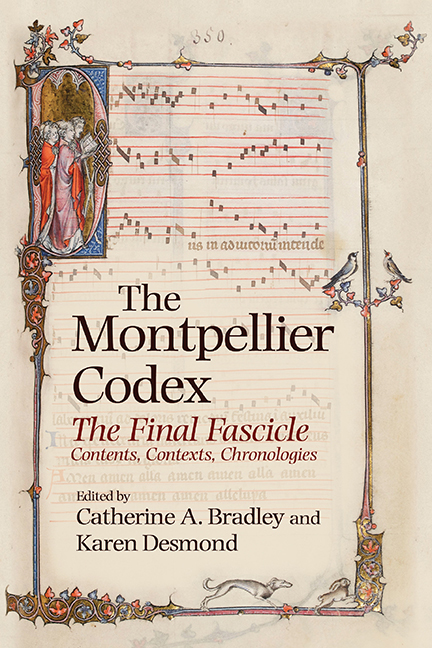Book contents
- Frontmatter
- Contents
- Figures
- Musical examples
- Tables
- Acknowledgements
- List of manuscript sigla
- Abbreviations
- Table of fascicle 8 contents
- Introduction
- I The Material Object
- II INNOVATION AND TRADITION
- III ANALYTICAL CASE STUDIES
- 13 Montpellier 8 PORTARE Motets and Tonal Exploration
- 14 Repetitions, Rhythmical Evolution, and Rhetoric in the Montpellier Codex
- 15 Shedding Light on Mo 8,304: Alma virgo virginum/Benedicta es, Maria
- 16 A Performance and Reception History of On parole/A Paris/FRESE NOUVELE
- Bibliography
- Contributors
- General index
- Index of compositions, alphabetical
- Index of compositions in Mo, manuscript order
- Miscellaneous Endmatter
16 - A Performance and Reception History of On parole/A Paris/FRESE NOUVELE
from III - ANALYTICAL CASE STUDIES
Published online by Cambridge University Press: 04 July 2019
- Frontmatter
- Contents
- Figures
- Musical examples
- Tables
- Acknowledgements
- List of manuscript sigla
- Abbreviations
- Table of fascicle 8 contents
- Introduction
- I The Material Object
- II INNOVATION AND TRADITION
- III ANALYTICAL CASE STUDIES
- 13 Montpellier 8 PORTARE Motets and Tonal Exploration
- 14 Repetitions, Rhythmical Evolution, and Rhetoric in the Montpellier Codex
- 15 Shedding Light on Mo 8,304: Alma virgo virginum/Benedicta es, Maria
- 16 A Performance and Reception History of On parole/A Paris/FRESE NOUVELE
- Bibliography
- Contributors
- General index
- Index of compositions, alphabetical
- Index of compositions in Mo, manuscript order
- Miscellaneous Endmatter
Summary
MONTPELLIER 8's motet On parole/A Paris/FRESE NOUVELE (Mo 8,319, fols 368v–369v) is an intriguing polytextual work with an equally intriguing performance history. It has caught the imagination of many musicians who have explored the various performance possibilities suggested by the text.
The written personal communication of Thurston Dart offers a unique opportunity to understand how his performance of this particular motet was planned and executed in the late 1960s. It also suggests ways in which his opinion influenced some of the first performances to be recorded. ‘Make the music sound robust now and again’ was Dart's advice to Michael Morrow and his ensemble Musica Reservata. Little did Dart know just quite how literally these young musicians would take him at his word. For Musica Reservata, On parole/A Paris/FRESE NOUVELE required an almost military approach to rhythmic drive, resulting in a highly organized market-traders’ cacophony, whereas in Dart's own conception this street scene unfolded across the newly available stereophonic soundscape of late 1960s LP technology. As Emma Dillon explains, the attraction of On parole/A Paris/FRESE NOUVELE is that it ‘offers us a rare instance where the city itself is the topic of the motet’. Through this urban prism Dart (re)constructed a vision of medieval Paris which made sense in his modern world, and subsequent performances reacted to his historical imagination.
This paper explores the first four recordings of this evocative motet, with particular emphasis on the circumstances surrounding Dart's much-delayed album, and probes the musicological climate behind each. With reference to the influential work of Yvonne Rokseth, it asks how much these performances say about the changing twentieth-century sense of the medieval and what they suggest about the changing musicological approaches to the famous Montpellier codex itself.
Central to understanding these performances is the tenor voice whose melody and words appear to preserve a street cry:
Frese nouvele! Muere france! Muere! Muere france!
Fresh strawberries! Ripe and French!
Such is the musicological temptation to seek the evanescent traces of folk practice in secular motet voices that performers have been tempted to approach this motet as an orchestrated song collected from the street: the ‘Jesus’ Blood’ of its day, if you will. Yet might this tenor voice parody, rather than preserve, a well-known cry or cries of its day by making humorous the fruit vendor whose singing is steady enough to create a motet tenor?
- Type
- Chapter
- Information
- The Montpellier CodexThe Final Fascicle. Contents, Contexts, Chronologies, pp. 283 - 298Publisher: Boydell & BrewerPrint publication year: 2018

